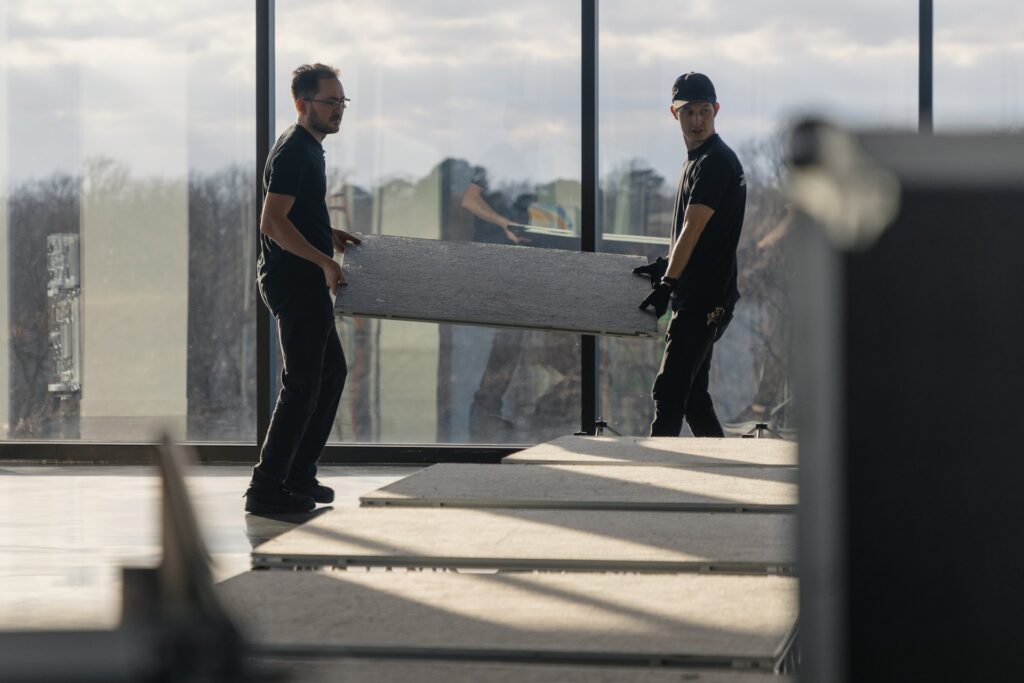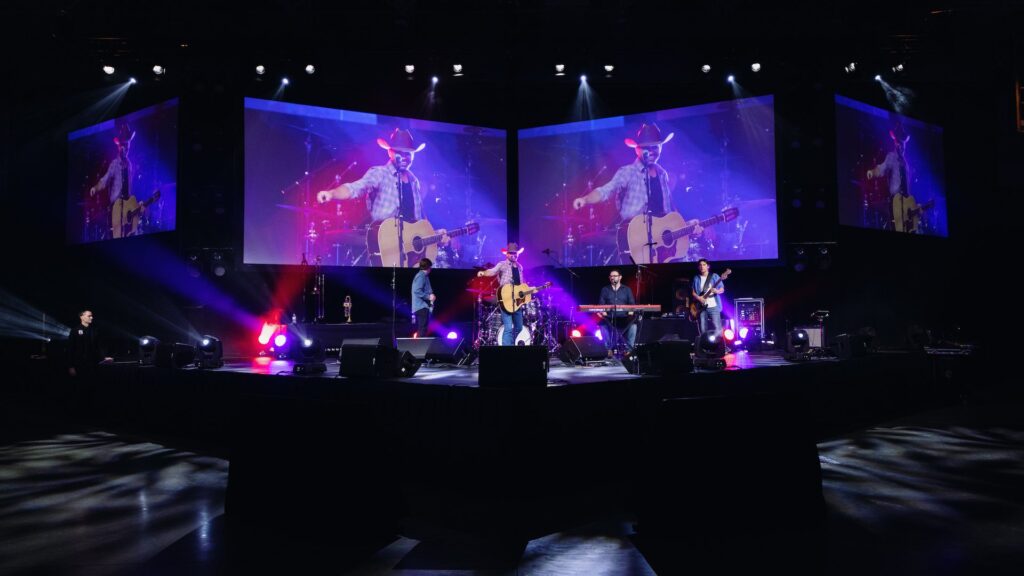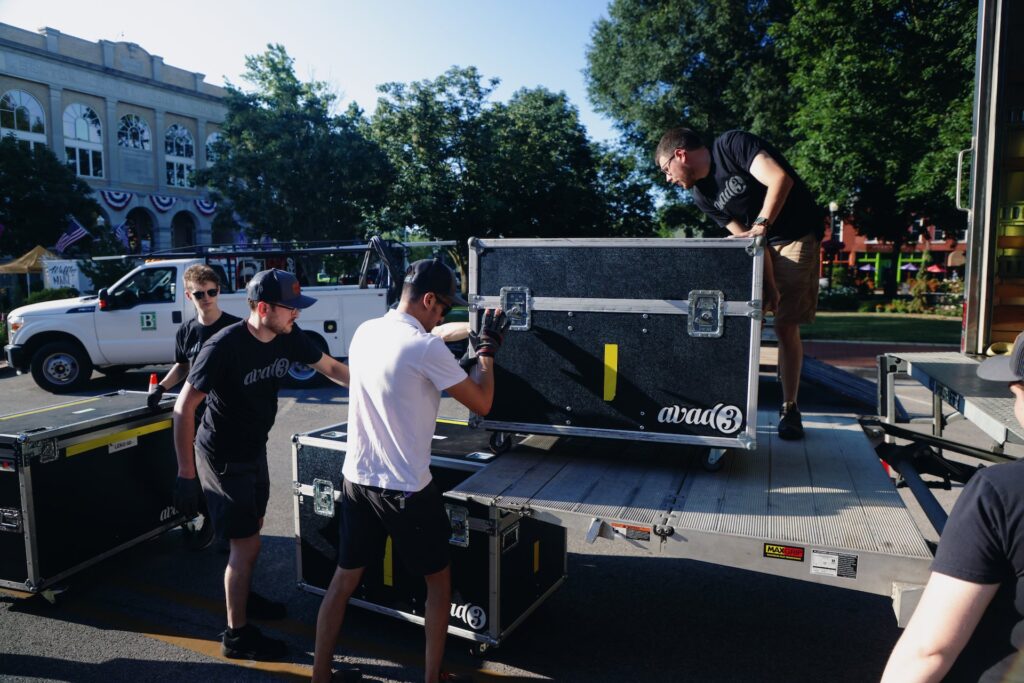Event production is, as the kids say, a whole thing. Gone are the days of setting up a microphone on a stage and calling it good, or shining a giant manual spotlight on a presenter. As technology evolves and the needs and goals of events become more complex and sophisticated, it is more important than ever that event production is a prioritized aspect of planning.
What is Event Production?
It can be hard to understand exactly what event production is, especially when there is also event planning and event management. Consider this analogy. A mom wants to throw her 9 year old a birthday party at a trampoline park. She decides on the party theme, sends out the invitations, orders the cake. She is the event planner. At the party, her husband and her sister hand out the treat bags, make sure each kid gets the type of pizza they want, and announce when it’s time to sing Happy Birthday. They are the event managers. The workers at the trampoline park are the event producers. They are in charge of having the logistics ready to go. They make sure the setup is conducive to the flow of the party, and they work behind the scenes to make sure there are no glitches. They lend their expertise to the party planner and managers so they don’t misstep by, say, letting the kids jump right after eating tons of cake or trying to sing when an announcement is about to be made on the PA system. The mom runs one birthday party a year- they run hundreds. They know birthday parties, and they make them run smoothly so everyone goes home happy.
Unlike trampoline park parties though, most corporate events and nonprofit events don’t come with their own built in event production team. That’s why it is essential for event planners to find a production company that they trust very early in the planning process.
So what does event production look like on a larger, more modern scale? The process can be broken down into four parts.
The event production process
Pre-production
This stage begins as soon as a production company is brought on board. The client and event producer will meet to discuss the vision and goals for the event. Once the producer understands the client’s needs, they can begin creating a comprehensive production plan. Pre-production is also when the client will experience the variety of services the production company offers that might benefit the event apart from audio visual and lighting work, like graphics and creative content, streaming, video production, and even off-site rehearsals for speakers and presenters. The production plan can evolve as the event does, but it remains central to the process.

On site
As the event approaches and the client gains access to the venue, the production team gets to work. An experienced team sets up the equipment and runs through the plan. Rehearsals with presenters are conducted, and tech is checked and double checked so it’s ready to roll and totally dependable. All of this is done in harmony with the other facets of event setup that are occurring. A good production team is never in the way or causing problems for anyone else.

Show day(s)
For the duration of the event, the production team is on full throttle.They are executing the production plan to the smallest detail. They are running sound, lighting, and visual logistics smoothly and efficiently. If the event has a virtual component they are managing streaming and connectivity. Someone is always available for any questions from the event managers, and to handle any last minute needs.

Load out
No one loves to clean up after an event is over, but a production team’s job is not over and the end is just as important as the beginning. They make sure breakdown and cleanup of equipment is done quickly and professionally.

Roles in event production
Event production is clearly a lot of work, and it takes a team of professionals to do it well. The producer of the event is typically the main point of contact for the event planners and managers. They know everything that is supposed to happen (and not happen) and who is in charge of what. Audio/visual engineers are onsite during the event to run the equipment that allows the event to proceed. A qualified crew handles the innumerable small details that no one thinks of unless they don’t get done- putting microphones in panel seats, sticking extra batteries in multiple places, taping down cords so no one trips. At larger events there may be production managers or team leads to head up the different areas of production, so the producer can focus on the big picture. It is absolutely essential that the entire team is on the same page and has a solid communication process in place.
Types of events and production needs
Part of the benefit of good event production is the ability to customize it to an event’s specific needs. A 2-hour meeting has an entirely different set of requirements than a multi-day conference, and a gala or banquet is nothing like either of those. Each venue space and each audience is different. A production company is able to tailor each production plan to get clients exactly where they need to be. There will always be challenges in the planning process. Events are constantly changing as the date nears. Sometimes planners will have to suddenly modify the goals or budget, a venue will cancel, or a presenter will have to back out. Flexibility is key and production companies are ready for whatever comes their way.
Cost and budgeting in event production
It may seem counterintuitive to hire a production company if your goal is to save money, but it is absolutely the move if budget is a key consideration. Sometimes an event is all about efficiency and expediency; sometimes the goal is to make a statement and leave attendees excited and wowed. Production companies know venues, they know tech, and they know events. They are in the best position to guide a client to solutions that fit their needs without wasting money on unnecessary or redundant equipment. If they are involved early enough, they can even help clients select a venue that will be the most cost efficient in terms of production and setup. A beautiful inexpensive venue is great until it’s discovered that a custom stage will be required that will cost more than the venue itself. Informed decisions are always ideal and production companies help their clients make informed decisions.
Post-event evaluation
After an event is over, a good production company will schedule a follow up meeting with the client to ensure all expectations were met and to discuss how the outcomes will shape future events. The more often a production company and client work together, the better the production company can anticipate the client’s needs and offer more creative solutions.

The Importance & Impact of Event Production
Event production plays a crucial role in the success and impact of any event, whether it’s a corporate conference, music festival, or gala. It encompasses a broad range of activities, including planning, logistics, technical support, and creative design, ensuring that every aspect of the event runs smoothly and cohesively. Effective event production enhances the attendee experience by creating a memorable and engaging atmosphere, which can significantly influence the perception and reputation of the host organization or brand. Moreover, well-executed events can drive substantial economic benefits, generate media coverage, and foster community engagement. In essence, professional event production not only ensures operational efficiency but also amplifies the overall impact and success of the event.
Working with professional event production companies
Event planners should never limit themselves to considering production companies in the same city as the event. Many production companies work nationally. The right fit is not limited to geography- it’s more about who has the experience, expertise, and ability to get the job done. Hiring companies that aren’t based in large cities can save money as well, since they often have lower overhead costs. A good fit is one that clearly understands the event type a client is hosting, has adequate equipment, staff, and experience to do the job, and shows a dedication to the process and a respect for a client’s vision and budget.
Event production combines audio visual, logistical, and technical planning to create an infrastructure that supports and enhances the event. It is a critical component to an event’s success and seasoned event planners know that hiring the right production company is one of the most important things on their to-do list. A successful event production means satisfied stakeholders, attendees, and planners. You wouldn’t want to have a trampoline park party without the help of the park experts, and you should never try to have an event without the help of a great production company.
